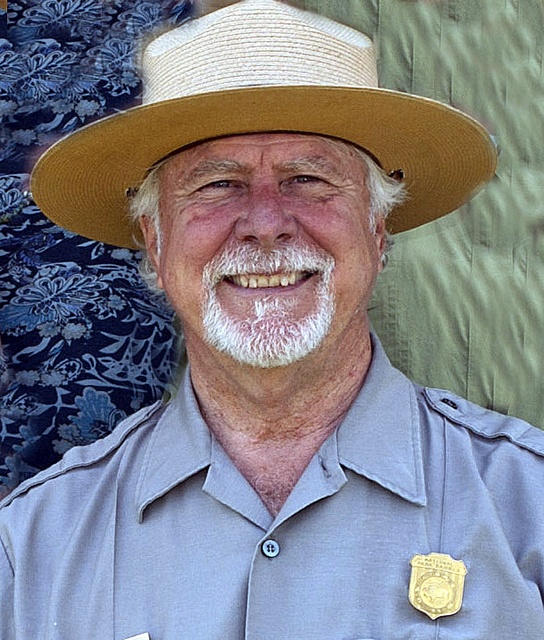More than 50 people packed into the San Juan Island Library on a stormy evening Dec. 2 to congratulate Mike Vouri on his retirement, and listen to him spin wild tales about the 20 years he has spent at the National Park. Excitement was in the air, but there was also a solemnness. This night was the beginning of the end of an era. Never fear, Mike isn’t leaving our island soon.
Vouri opened the slide show with a photo of his grandfather, Paul Bentley, and dedicated the evening to him, the man who introduced him to the islands. Immediately, ten-year-old Mike fell in love with everything about the islands; the characters he met, lush vegetation, even riding ferries as well as the National Park that opened in 1966. His grandfather encouraged him frequently to get a job at “that beautiful park.”
Vouri didn’t disregard his grandfathers’ advice, but he loved writing, story-telling and history. He couldn’t imagine a way to incorporate those passions working as a ranger. He attended Western University and became engrossed with the Bellingham community. Working for the Whatcom Museum rekindled his connection with the park. As it happened, he was coordinating an exhibit about George Pickett and needed to borrow some artifacts from then National Park Ranger Bill Gleason, who hired him in 1995.
Change doesn’t usually occur drastically, over-night, but in small incremental stages. It began innocently enough for Vouri in his new position, improving toilets. All the parks’ toilets were “hand-me-downs,” in such terrible condition English Camp’s was dubbed “Hole of Calcutta.”
“I thought everyone would be excited about the improvement,” Mike commented wryly, “A few days after American Camp’s was finished, someone shot holes in the door.”
The slide show continued with photos of staff and volunteers who had come and gone.
“The key with volunteers is that they need to be consistent, and Becky Knoll was. She knew how to handle visitors. She was kind, but tough,” he said showing a picture of her gentle face, eyes daring the camera. “One day we had an unhappy customer. He wanted to really come at me. Becky blocked the door, wouldn’t let him in. ‘You want to leave it,’ Becky said. I’ll never forget that.”
There were shots of the old park office no longer on Spring Street, assorted renovations, archeological classes, Fourth of July parades, and General Pickett events, of which Vouri says “Without help from so many I couldn’t have pulled it together.”
During the 150 year anniversary of the Pig War, the park received a record breaking 5,000 visitors. The schooner Lady Washington came up to help celebrate, offering rides from English Camp. Thirty people were waiting their turn, “Five minutes,” Mike said as he threw up his hands, “I went to the bathroom and was gone five minutes. When I returned, the dock had collapsed, people were flailing about in the water.”
In in 1995, 1996 and 2007 the park was forced to lock down during the government shutdowns. A foreboding photo of a chain-link padlocked across American Camps parking lot flashed across the screen. “Broke my heart when we had to do that.” He said with a lowered voice.
“Once I got a phone call from the park, ‘Mike, you’re going to love this!'”
Vouri rushed to the park to find two college-age boys hauling a cannon up from the beach. “They wanted to take it home, we explained no, no, no…” The audience laughed.
During the Pig War there were reports of ships practicing firing cannons. Historians assumed these were “dry shots.” These two college kids proved this was not the case. The cannon was placed in an exhibit but there is still a dent in the ground where it lay for over a hundred years, concealed by a Douglas fir.
Vouri touched on some of the parks controversies as well. “Lets talk,” a photo of a densely populated rabbit warren appeared on the screen, “about rabbits. My favorite time. My favorite time.” Laughter emanated from the crowd at Vouri’s reference to the parks attempt to control the rabbit population, which created a huge backlash from the community.
“Our thought [in regards to controlling rabbit population] was about restoring natural prairies, Camus and other wildflowers. We didn’t communicate well enough with the community. I do think we learned from that mistake.”
The year 2009 brought an end to George Pickett, minus one exception, years later, honoring long time ranger and volunteer Darlene Wahl after she passed away. One of the biggest changes was the recent rerouting of Cattle Point Road. Vouri had pictures of that as well with its new path over Mt. Finlayson.
“I know I’m leaving the park in good hands, and I’m optimistic about where it’s going in the future,” Vouri said with a smile.
We will adjust to this new era, Mike, but forgive us if we ask you if you have the day off when we see you around town wearing jeans rather than your uniform. It takes time to adjust.
By Heather Spaulding
Journal reporter




